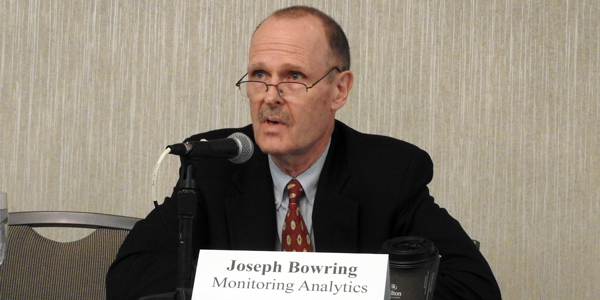The PJM Operating Committee on Thursday unanimously approved an initiative to consider rule changes for the substitution and termination of black start resources.
David Kimmel of PJM reviewed the problem statement and issue charge, focusing on four areas in the Tariff that the RTO identified as in need of updates: testing requirements for black start resources not compensated through Schedule 6A; black start unit substitution rules; black start termination rules; and the black start capital recovery factor. (See PJM Eyeing New Black Start Changes.)
In March, PJM suspended an initiative considering fuel security requirements for black start units, which faced opposition from state regulators and consumer advocates. (See PJM Backs off Black Start Fuel Rule.)
Stakeholders also unanimously approved an amendment to the problem statement and issue charge proposed by Independent Market Monitor Joe Bowring to add an update to rules governing oil-carrying costs and minimum tank suction levels (MTSL).
Bowring said the MTSL issue has been left unaddressed in the Tariff for several years, leaving no clear language as to how shared resources like fuel tanks should be treated. He said many black start units charge customers for 100% of the MTSL. That charge is overstated when the tanks were sized to meet the needs of the generating units that share the tank and that use significantly more oil than the black start requirements, he argues.
The Monitor recommends that only a proportionate share of the MTSL for oil tanks shared with other resources be allocated for black start units, Bowring said, as this would help ensure that only costs directly related to black start service are paid by customers. (See “Black Start Fuel Assurance,” PJM Operating Committee Briefs: May 1, 2018.)
Becky Davis of PJM provided education on black start testing, termination rules, substitution and the capital recovery factor.
The work time on the black start issue is expected to take two to three months, and implementation of the changes needed to governing documents is estimated to take about six months following the potential Tariff changes.
COVID-19 Still Impacting Load
PJM’s Stephanie Monzon reviewed the April operating metrics, pointing to an hourly average error in load forecasting of 2.61% and a peak error of 2.31%.
Monzon said PJM continues to see the effects of state stay-at-home orders resulting from the COVID-19 pandemic and the impacts of warmer weather on load forecasting. Monzon said forecasters have predominantly over-forecasted on most days but remain within the target error of +/-3%.
Gary Greiner, director of market policy for Public Service Enterprise Group, asked about April 13, when PJM’s forecast fell short by more than 8%.
Monzon said there was an unexpected morning peak in the Mid-Atlantic region. As the control room operators were adjusting for the morning peak, Monzon said, the models were trying to adjust for a different expected peak.
Greiner said that when the operator adjusts the forecast, that adjustment becomes the reported forecast and can have a major impact on pricing.
“It seems like I’m being nitpicky, but this is a huge driver of price, so it’s an important error to minimize,” Greiner said.
Monzon reported that the only spinning event for the month was also on April 13, lasting for eight minutes from 3:53 to 4:01 p.m. in the Mid-Atlantic Dominion sub-zone. Monzon said the event consisted of a Tier 1 estimate of 433 MW and a Tier 1 response of 207.2 MW.
She also said that overall, April was a quiet operational month, with five reserve sharing events with the Northeast Power Coordinating Council, 12 post-contingency local load relief warnings and eight high system voltages.
Two shortage cases were also approved, Monzon said, with both occurring on April 30 at 11:55 a.m. and 12:05 p.m. She said PJM was seeing generation that was expected to serve load start staggering online and had some generation trip off the system.






